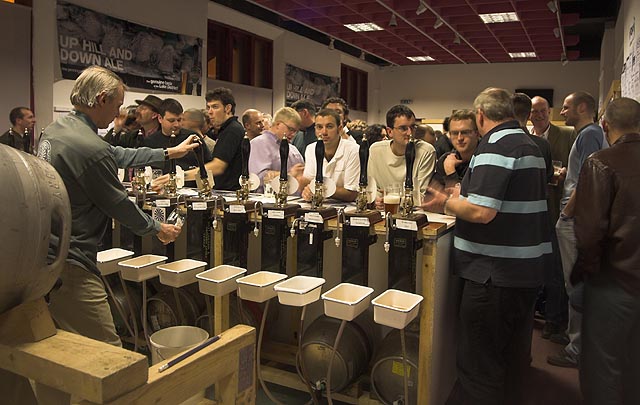In Cockermouth we no longer have the working Jennings brewery, which supplies a variety of beers to most of the pubs and hotels in the area.
How beer is made
Beer is produced by the fermentation of sugars derived from starch-based material — the most common being malted barley.
The basic ingredients of the vast majority of beers are malted barley, hops, water and yeast. Hops are used to impart bitterness, flavor and aroma to beer, and also for their natural antiseptic qualities. The yeast in beer causes fermentation.
Beer uses varying ingredients, production methods and traditions. The type of yeast and production method may be used to classify beer into ale or lager.
The essential stages of brewing are mashing, sparging, boiling, fermentation, and packaging.
Mashing manipulates the temperature of a mixture of water and a starch source (known as mash) in order to convert starches to fermentable sugars. The mash is raised to a desired temperature and left at that temperature for a period of time. During this stage, enzymes, alpha and beta amylase, primarily break down the long dextrins that are present in the mash into simpler fermentable sugars such as glucose, in the starch source produce compounds needed for fermentation and further mashing, including the fermentable sugars.
Sparging (also known as lautering) extracts the fermentable liquid, known as wort, from the mash. The brewer also adds water to the lauter-tun and lets it flow through the mash and collects it as well. This rinses fermentable liquid from the grain in the mash and allows the brewer to gather as much of the fermentable liquid from the mash as possible. The leftover grain is not further used in making the beer.
Boiling sterilizes the wort and increases the concentration of sugar in the wort. The wort collected from sparging is put in a kettle and boiled, usually for about one hour. During boiling, water in the wort evaporates, but the sugars and other components of the wort remain; this allows more efficient use of the starch sources in the beer. Hops are added during boiling in order to extract bitterness, flavor and aroma from them.
Fermentation uses yeast to turn the sugars in wort to alcohol and carbon dioxide. During fermentation, the wort becomes beer. Once the boiled wort is cooled and in a fermenter, yeast is propagated in the wort and it is left to ferment, which requires a week to months depending on the type of yeast and strength of the beer. In addition to producing alcohol, fine particulate matter suspended in the wort settles during fermentation. Once fermentation is complete, the yeast also settles, leaving the beer clear.
Packaging, the fifth and final stage of the brewing process, prepares the beer for distribution and consumption. During packaging, beer is put into the vessel from which it will be served — a keg, cask, can or bottle. Beer is carbonated in its package, either by forcing carbon dioxide into the beer or by "natural carbonation." Naturally carbonated beers have a small amount of sugar added to them during packaging. This causes a short period of fermentation which produces carbon dioxide to carbonate the beer.
Traditional types of English beer include bitter, mild, stout, porter, India pale ale, Brown ale, and Old ale.
The Loweswater Brewery
Roger Humphreys and Matt Webster of the Kirkstile Inn, Loweswater revived an old tradition; they have documentary evidence that brewing took place at Kirkstile some 200 years ago, probably in the old Dairy building.
Their brewery, was formerly located in an old outbuilding attached to the Inn. The popular brews are now brewed off site.
Melbreak Bitter was Whitehaven's Beer of the Festival 2004 and the festival special (Haven Pride) brewed here was the first beer at the festival to sell out. Regular beers are Melbreak Bitter, Grasmoor Dark Ale, and Kirkstile Gold.
Loweswater's Kirkstile Gold won the 'Beer of the Festival' at the 2006 Pendle Beer Festival. Congratulations to talented brewer and CAMRA member, Matt Webster!
The Kirkstile Inn at Loweswater is one of twelve entries for Cumbria in CAMRA's Good Pub Food Guide, and has been chosen as West Cumbria CAMRA's Pub of the year for 2003, 2004, 2005.
The Kirkstile is now bottling their own beers.
Link: The Kirkstile Inn
The Bitter End
Mike and Sue Askey ran the Bitter End from 1995. The Bitter End, called because it is close to the end of the Bitter Beck in Cockermouth, is niow under new ownership and provides meals and a range of real ales.
Link: The Bitter End
Jennings Brewery
Jennings Castle brewery, Cockermouth is no longer brewing on site.
Links : Jennings Brewery Tour and Jennings Brewery.

2006 Beer Festival at the Kirkgate. Photo by Jon Sharp.
Related Links :
